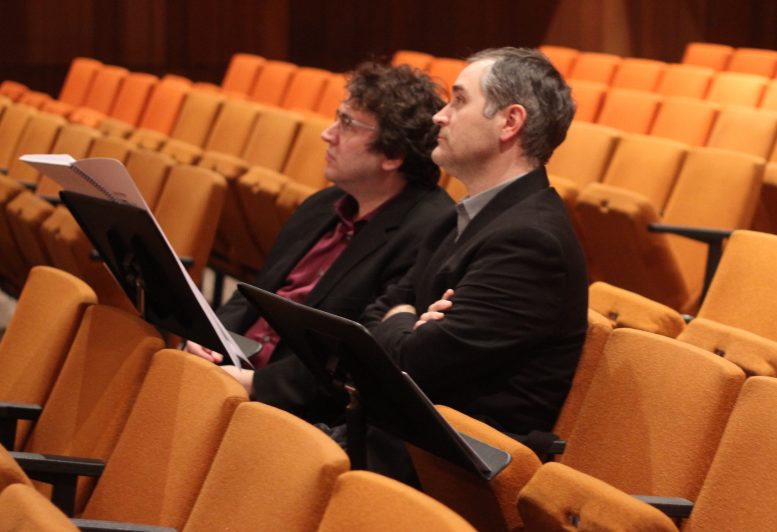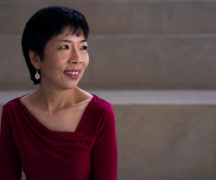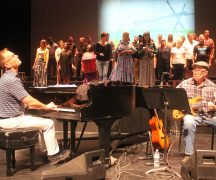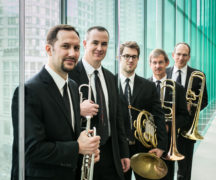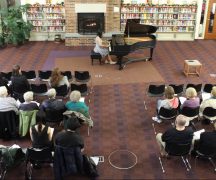By DAVID DUPONT
BG Independent News
When Alain Trudel debuts as conductor of the Toledo Symphony Orchestra, Sept. 21 and 22, (http://bgindependentmedia.org/toledo-symphony-welcomes-trudel-as-music-director-kicks-off-75th-anniversary-season/) he’ll call on some heavy hitters in classical music to help with the introductions.
The concerts will open with Beethoven’s iconic Fifth Symphony and its majestic four-note clarion call.
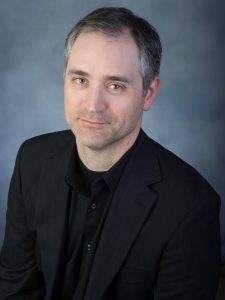
Christopher Dietz
The second half will be devoted to the music from Tchaikovsky’s ballet “Swan Lake” with dancers from the Toledo Ballet.
And then tucked in between Beethoven and the intermission will be “Caldera” by Christopher Dietz, a professor of composition at Bowling Green State University.
Dietz said he’s delighted to be on the program. “It’s a little weird seeing my name in the middle between those two,” he said.
While his fellow composers on the program are represented by mature work, “Caldera” was actually Dietz’ first successful orchestral piece.
He composed it in 2004 while he was studying for his doctorate at the University of Michigan.
The title means a large volcanic crater, but that came well after the piece was composed Dietz said. “I just wanted to write 11 to 12 minutes of robust, energetic, intense orchestral music.”
This was not his first try. “The first one was so big and grotesque and impossible to play,” he said. The second was a chamber symphony that “lacked chutzpah.”
“Caldera” hit the Goldilocks spot. The piece has a churning, forward momentum full of sparkling instrumental touches. Every instrument in the orchestra gets a chance to shine.
Dietz said in this instance he “had a better sense of what an orchestra can do given the rehearsal time they have.”
This is the second time the orchestra will perform “Caldera.” Back in 2007, then Resident Conductor Chelsea Tipton put the piece on a Classics Concert he was leading.
Dietz knew Tipton through his wife, Emily Price Dietz, who has played French horn in the orchestra since 2000.
Dietz said he showed the piece to the conductor and was surprised he programmed it.
“Caldera” resurfaced during conversations between Dietz and the orchestra’s CEO Zak Vassar at the Toledo Symphony Student Composer Reading Sessions. Dietz initiated that program when he came to BGSU in 2010.
Vassar was interested in having a new orchestral work from the composer, and that was arranged, and will be performed next season by the symphony. Dietz, 41, on sabbatical is now working on the piece at his home in Perrysburg where he lives with his wife and their two children.
In the meantime, they agreed that “Caldera” could be performed this season.
Dietz said he’s been reviewing the work recently as he prepares to meet with Trudel to discuss its performance. He’s overall pleased, though he sees sections he would handle differently.
The structure of the program reflects the new conductor’s sense of adventure. Symphony concerts do not typically begin with a major work, and certainly not one with the gravitas and familiarity of the Fifth.
“He’s an unconventional thinker” with a “fluid sense of programming,” Dietz said, yet someone well grounded in orchestra culture. He made his debut as a solo trombonist with the Montreal Symphony Orchestra at 18.
Dietz was not such a prodigy. Growing up in Whitefish Bay, Wisconsin, just outside Milwaukee, he was an average trumpet player, he said. His father was an FBI agent, as had been his maternal grandfather.
His interest in music blossomed when at 13 he got a guitar, and soon started playing in rock bands. He also continued as a singer in the school choir as well as playing in band and orchestra. He even went with friends to audition for the Milwaukee Youth Orchestra, but didn’t get in. There was a theory class taught by composer John Downey, who had studied with the legendary Nadia Boulanger and others, that he signed up for.
Soon Dietz was sitting in the back of his high school classes “doodling little musical sketches.”
It was akin to playing with musical Legos. Thanks to a vocal scholarship, he attended the University of Wisconsin-Madison.
The campus was “an electric environment,” Dietz said. “I went from a very, very average high school student at least academically to an overachieving undergrad gobbling up everything.”
He went from being a vocal major to a composition major. After Wisconsin he attended the Manhattan School of Music while his wife took her place in the Toledo Symphony.
As a high school student, he’d studied the classical symphonies. Instead of collecting baseball cards, “I collected dead Germans.” Then at Wisconsin he focused Stravinsky, Debussy and other masters of the early 20th Century. In New York, he discovered a thriving contemporary music scene as well as Renaissance music. “I was just becoming more omnivorous.”
Now when he composes, his music is not shaped by any particular model, but by the most recent piece he completed. He looks to growing from and improving on that.
He returned to the Midwest to get his doctorate at Michigan where he studied with William Bolcom. After three years of teaching at Oberlin College and Hillsdale College, he was hired to fill the vacancy created when Burton Beerman retired from the composition faculty.
Dietz started the reading sessions with financial support from Karol Spencer to give BGSU students a taste of what he had when he was chosen to attend an institute for composers hosted by the Minnesota Orchestra. There his piece was not only played but he had two-hour long consultations with the principal instrumentalists.
BGSU’s reading session is “a great experience for students,” he said.
It has also meant that over those six years Dietz has heard the orchestra play 30 new works.
That got him to thinking: “What would I do if I had the chance to write another piece form Toledo Symphony? What do you know!”

